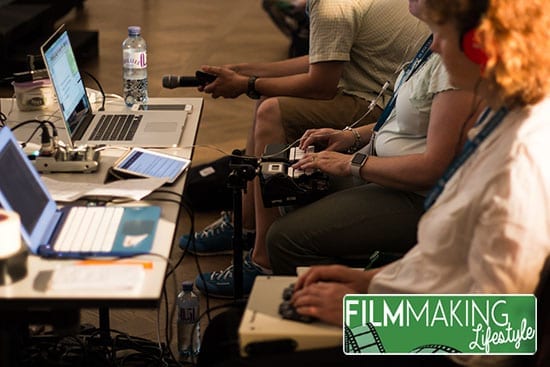Another name for false productivity is spinning your wheels. In this article, we’re going to cover a number of productivity techniques and methods that will enable you to increase your personal effectiveness and be productive.
You need to avoid making mistakes like getting involved with ‘busy work’ and spinning your wheels. I’ve covered productivity a lot on the site before.
This article will take you through a 6 Step process to be more productive and it’ll help you get twice as much done in 40% less time.
Bold statement? Read on and learn how to really be productive.
Step 1: Work On Only One Or Two Goals At A Time
You’ve probably read all about how you need to set goals and write them down. Yeah yeah, we’ve all heard that, and it’s good advice. Every important goal in my life is written down and very specific.
By the way, if for some reason you don’t have your key goals written down, write them down. Right now.
Seriously. Stop reading this and go write them down. It’s that important.
Okay. That’s the easy part. Here’s the part a lot of high- powered, high-energy people screw up:
They write down their goals and get really excited. Especially if it’s around New Years Eve. Then they take all five, or ten, or twenty-seven goals and start blowing their brains out trying to hit all of them.
For a short while, they’re excited and make progress on some of the goals. Soon however, they start getting:
- Tired, and
- Distracted.
Their focus is completely diffused. They have excitement, but lack power and momentum. Their efforts are spread all over the place.
In the end, they hit none of their goals. If they’re very lucky, they might hit one goal. Even then, it takes way longer than they initially planned on.
I see people do this all the time. It used to happen to me, too. No longer.
One of the best time management, personal effectiveness techniques you can possibly implement is to force yourself to work on only one or two goals (or projects) at a time. Just one or two. That’s it. One is much better than two, but I’ll be nice and say two, max.
If you’re a dynamic person, this will be hard. Trust me, I know. You’re going to want to get it all done, right now.
You likely have at least five goals, perhaps as many as fifteen goals that you really, really want right now.
I’m here to tell you that human beings just aren’t designed to pursue that many goals at once. Hell, we can barely hit one or two goals at a time much less five or ten or fifteen.
Force yourself (and it will take some force) to go through your list of goals, pick out your most important one or two, and place the rest of them on pause.
That doesn’t mean you’re abandoning your other goals! Far from it. They’re just “on pause”. You’ll get back to them soon.
Then throw 100% of your effort and focus on your one or two (preferably one) current goal(s), and don’t stop until you hit them. Which you probably will, as long as you stay focused (which we’ll cover in step four).
Then, and only then, go back to your goal list and pick out another one or two goals, and work on those. Rinse and repeat.
Just make sure you are never working on more than one or two key goals (or projects) at a time.
Step 2: Review Your To Do List Every 3 Days
“Wait a minute!” you say, “Aren’t you supposed to review your to do list every day?”
That’s decent advice I suppose. There’s just two problems with it:
1. Years ago, Steven Covey once talked about how reviewing your projects and to do lists on a daily basis forced you into a constant state of crisis management.
He was right. If you attack your to do list every single day, you’re going to soon start to view only one day as your time horizon, and you’ll rapidly start to lose any long-term perspective in your life (other than on your birthday or New Years Eve, of course).
You’ll get very good at putting out fires, but very bad at accomplishing the long-term important stuff.
2. You won’t do it. Believe me, you won’t.
If some business guru tells you to review your to do list every day, for a while you’ll probably do it, but there will be many days you’re too busy and you won’t.
Come on. You know that’s true.
I don’t care how motivated or organized you are. You’re not going to check your to do list every day. You’re too busy.
Some time management experts have suggested that you only go over your projects and to do list once a week. That way it forces you to address all the key areas of your life and avoids a crisis management focus.
That’s good advice, sort of. Before cell phones and smart phones and Facebook and instant messaging and LinkedIn and email and texting and the Kardashian sisters, that was probably true. But in the 21st century, once a week just isn’t going to cut it.
The solution is to make sure you review all of your goals / projects (you only have one or two, remember?) and your to do list once every three days. No more, no less.
I have found that three days is perfect. It’s plenty of time to make sure you address your to do items no matter how busy you are. It also allows you to plan out the next three days instead of just the next eight hours, which means you can really get some high-impact accomplishments done.
Once a day is too much (and in many cases, impossible). Once a week is not enough. Every three days is just right.
Just schedule 30 to 60 minutes in your schedule once every three days. Day or eve is up to you. Then figure out where you are, where you need to go, and what you should do over the next three days.
Try it. It will make an immediate and massive difference both in your effectiveness and your piece of mind.
Step 3: Focus On Your Highest-return Tasks
When you have a list of to do tasks in front of you, there’s an overwhelming temptation to do the tasks that will relieve the most pressure, not the tasks that will render you the highest return.
In the words of Brian Tracy, people tend to focus on activities that are “tension-relieving, rather than goal-achieving.”
Let’s say your to do list has five people you need to call back, all of which are of low to medium importance, and a sales project to possibly pull in a new paying customer.
The sales project is a little intimidating and seems like “work” to you. Most likely, you’re going to postpone that sales project and start calling people. Namely because:
- Some of them sounded impatient when they left you a voice mail, even though what they were calling about was not an emergency. You feel pressure to call them back.
- Sitting at your desk and kicking back and talking on the phone is easy. Doing that sales project is hard.
- You rationalize that the sales project won’t get mad at you if you put it off, but one of those people you need to call might.
So, you end up pushing back the sales project and start calling people back. Each one of the people you talk to gives you two or three more things to do, so once off the phone (or even during the phone calls!) you start working on some other tasks.
By the time you’re back from lunch, a few other things have come up, so now you’re working on them too. Before you know it, it’s 5pm and time to go pick up the kids and go home.
The sales project goes undone. Again.
You’ve probably done this, or something like this, a thousand times or more.
The sales project has a far more powerful and positive effect on your life and your future than returning five phone calls, yet you choose the phone calls.
Of course this is just an example. Every day you are given the choice between low to medium-return tasks that “demand” your attention vs. one or two high-return tasks that don’t.
If you’ve ever wondered why you seem to make the same amount of money every year without any big increases, this is likely why. You’re postponing or completely ignoring the high-return tasks.
Force yourself to get at least one high-return task done first thing in the day. If it’s a big project then at a bare minimum force yourself to devote one hour to it in the morning. Then you can get to all the “easy” low and medium-return tasks that are bugging you.
Doing this one step alone can change your life.
Step 4: Track Your Progress On Paper
Want a technique that will give you an almost instant boost in results the very first time you try it?
Do this:
1. Start With The Goal
Take the goal you are currently working on. (You only have one or two of these, remember?) For example, let’s say your goal is to increase your income by 30%.
2. Convert Your Goal Into A Number
Convert your goal to a number with a weekly or monthly deadline. In keeping with the example, let’s say your goal is to make $6000 by the end of the month.
3. Convert Your Goal Into Small Bite-sized Chunks
Convert your goal into small bite-sized chunks. Using a spreadsheet or similar, print out your goal in blocks of these chunks.
Using our example, you would print out “I make $6000” or “$6000 By January 31st”.
Under that would be 60 small numbered squares, each one representing $100 each, totaling $6000.
You could do this the same way if your goal was to lose weight, perform a number of sales calls, or even complete a large project (using number of pages written, for example).
4. Clear A Space
Clear a space on your desk for this piece of paper and always have it visible there. Keep a bright yellow highlighter pen right by it at all times.
5. Get To Work With Your Highlighter
Every time you get paid (using our example), take a highlighter and mark off how much you received, like a thermometer showing how close you are to your goal.
If you got a check for $1000, you would yellow highlight 10 squares.
Make sure you highlight your squares as soon as you receive money. Don’t wait!
6. Force Yourself To Take Action
Force yourself to highlight all the squares by the end of your goal period (one week or one month).
You’ll find when you do this, you will be excited to highlight more squares. Your brain will be constantly honed and focused on getting more squares. I have been shocked at how well I do whenever I do this.
This was one of the ways I took my business from scratch years ago to a six-figure income. I still use this method to this day when I start getting into a slump or to get motivated for a new goal or project. This technique works.
It’s very important that you keep your goal tracker visible and on your desk at all times. Every time you sit down or look over your desk you’ll see it (or at least your subconscious will).
Don’t ever put other paperwork on top of it. Make it sacrosanct. Those bright yellow squares will always be calling to you to get it done. And you will. Try it and you’ll see.
Step 5: Make Sleep A Priority
Sleep? We’re talking about time management and personal effectiveness here…why the hell am I talking about sleep of all things?
The answer is very simple.
I figured out pretty quick in life, and I’m sure you did also, that you can abuse your body in all kinds of fun ways and still be able to more or less function at work.
- You can eat piles of crappy food,
- You guzzle coffee and beer,
- You can take all kinds of funky medication,
- You can smoke cigarettes (or other things),
- You can avoid exercising. You can stress out.
You can heap all kinds of these self-abusive things on your mind and body and most likely you’ll still be able to put in a somewhat decent eight hour work day the next day, especially if you’re under age 50 or so.
However! The one exception to all of this is sleep. If you don’t get enough sleep for your body, you will not be an effective person.
I don’t care how healthy or high-energy or motivated you are, if you’re not getting enough sleep, when you go up against people in the marketplace who make sleep a priority, you’re going to lose, and you’re not going to achieve the goals you want.
The typical person requires seven to eight hours of sleep per night. According to doctors and sleep experts, this is a weekly average. That means if you have one or two nights of less than seven hours of sleep, that’s fine as long as you catch it up some time in the next seven days or so.
I do know many people who only sleep five hours a night, every night, and seem to have plenty of energy the next day. I’m not a doctor, so I can’t speak to this professionally, but something about that just doesn’t jive.
I’ve seen that these people get more stressed out and short-tempered than someone who routinely gets seven to eight hours.
I’ve often wondered what would happen if these five-hour people forced themselves to relax a little and put in at least seven hours of sleep.
Regardless, you probably already know your “sleep number”, the number of hours you need in a night to feel good the next morning. Not feel okay, but feel good. My guess is that number is at least seven hours, possibly as much as nine hours.
One of your highest priorities in life is to make sure that on average you hit that number every night. The proper amount of sleep is critical to your long-term happiness and success in life. This cannot be understated.
Like I said, you can screw up other parts of your body and still (somewhat) be okay (at least in the short-term), but you can’t mess with your sleep. Not if you want to be a highly effective person.
Step 6: Be Selfish. Take Regular Time For Yourself
This next technique applies to everyone, but it’s really for the following types of people:
- Workaholics.
- Type A personalities.
- Women with small children.
- People with no passionate hobbies.
I’m sure you’ve heard the advice regarding how important it is to take time off from work, to take vacations, how you need to rest, etc, etc. Likely you’re going to ignore that advice especially if you fall into any of the four categories above.
I’m going to be a little more specific and change this up a little.
The single biggest problem with people who completely focus on one part of their life 24/7, like workaholic men who own a small company or a woman with small children, is that they over-focus on these areas to an unhealthy degree. This causes the following problems:
- Heightened stress.
- Short tempers.
- Health problems.
- Lack of sleep.
- Lack of focus on other important areas of life.
- More mistakes.
- Reduced efficiency.
- Artificially compressed worldview.
All of these things are terrible, terrible for your success and long-term happiness.
Over-focusing will suck out your soul while you think you’re being “efficient” or a “good person”.
That’s the trap with people who over-focus. They rationalize “My business needs me. No one can do it as good as I can” or “They’re just kids! I need to take care of them! They have to be the priority!”
The priority, yes. The only thing that consumes your life, no.
Every once and a while, you have got to call a time out on yourself and be 100% selfish and take time away from your life to focus on you.
When people say the word “vacation”, they envision a huge, stressful, expensive two-week trip to Disneyland with the family. That’s not what I’m talking about (though there’s nothing wrong with that either…Disneyland is awesome).
Your “me time” could be one night away at the beach. It could be an entire Tuesday spent at a spa. It could be one night away camping. It could be an evening by yourself reading a nonfiction book while sitting by your fire. Stop thinking in terms of “vacation” and start thinking instead about little “away jaunts”.
At least once every three months you should have at least one night away from your life. At least once a week you should take an evening or day event away and be selfish so that you can rest, rejuvenate, recharge, reflect, and enjoy your life.
This might be hard. I’ve always been a driven person myself so I feel your pain, trust me.
Often there are times I know I need to pull way “But I don’t want to, dammit!” I’ve gotten very good at forcing myself to pull away on a regular basis, and every time I do, I feel ten times better.
Then when I return to my work life (and I include raising small children as “work”) I’m always more effective at accomplishing my goals once I get back into the groove of getting things done.
Do this. Your body and mind will thank you (as will your loved ones, believe me!)
This article was written by Caleb Jones from Sublime Your Time. Caleb writes about business, personal effectiveness and investing. His site is regularly updated at least twice a week with proven principles and techniques you can use to get more done in less time with less stress to accomplish your goals.









